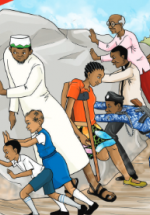Family and Community Engagement
Contextualizing the goals of social and emotional learning curricula and materials

Programs to promote social and emotional learning (SEL)
risk making assumptions about the global relevance of core
competences. Because scholarship is lacking about SEL in many
parts of the world, new approaches are needed to contextualize
the goals of SEL programs in a realistic time frame. Previous
work in anthropology and developmental psychology can help
us predict which competences are likely to be valued, given
the sociodemographic characteristics of a society. In rural
environments where subsistence agriculture is common, for
example, communities are likely to value social responsibility,
respect, and obedience. Attention should look beyond the needs
of the here and now, however, to speculate what competences
today’s children will require in the future. Looking at the current
variation of competences within a society—for example, the
values that teachers, but not parents, place on confidence and
curiosity—can help identify immediate pathways for developing
new competences. In all of these considerations, the goals of an SEL
program must be negotiated with the communities themselves in
order to ensure relevance, effectiveness, and acceptance. The hope
is that such considerations can help prevent global homogenization
of SEL programs, instead ensuring that they genuinely meet the
needs of the communities they aim to serve.

The central role of school culture and climate in fostering social and emotional learning: Evidence from Malawi and Uganda

The central role that the school and classroom environment
or ‘school climate’ plays in social and emotional learning (SEL)
is well documented, albeit mostly from US-based studies. RTI
International sought to understand how schools in Malawi and
Uganda organized themselves to provide positive and supportive
places for children to learn and to develop socially and emotionally.
The narratives captured in this study help explain how teacher
behaviors and school culture serve to nurture social and emotional
(SE) skills. Teachers, students, parents, and school management
committee (SMC) members discussed the importance of teacher
encouragement, friendliness and approachability, appreciation,
understanding of and listening to student viewpoints, and
modeling of cooperative teacher–teacher interactions to support
SEL. School qualities identified as important for SEL included
cooperation, student clubs and sports, a violence-free environment,
freedom of expression, and commitment to equality. The findings
yield insights into what schools can do to develop a culture of SEL,
in and outside the classroom.

The Intersection of School Climate, Social and Emotional Learning, and Emerging Reading: Longitudinal Study Baseline Report

The primary objective of the study is to evaluate the success of the Journeys intervention in improving school climate; shifting gender attitudes toward more gender equality; strengthening student’s SEL; and reducing the prevalence and extent that pupils experience bullying, corporal punishment, and sexual violence. A second objective of this study is to evaluate how progress on the intermediary variables of school climate, gender attitudes, and violence impacts improvements in attendance and reading outcomes.

National Learning Symposium on Creating a Safe and Positive Learning Environment Action Pack

Action pack/brief from National Learning Symposium on Creating a Safe and Positive Learning Environment held in Kampala, Uganda on September 19 - 20, 2019.
Results of the Social and Behavior Change Communication Campaign in Uganda to Eliminate Corporal Punishment in Schools Briefer 002

Briefer describing the Results of the Social and Behavior Change Communication Campaign in Uganda to Eliminate Corporal Punishment in Schools.
Social and Behavior Change Communication to Reduce Primary Teachers' use of Corporal Punishment in School - Endline Report

The United States Agency for International Development (USAID)/Uganda-funded Literacy Achievement and Retention Activity designed an eight-week social and behavior change communication (SBCC) pilot to measure the efficacy of SBCC in reducing teachers’ use of corporal punishment in schools.

Tukomye Okutuntuza! Tekugunjula IPC Talking Points

Interpersonal Communication Personnel Talking Points created by USAID/Uganda's Literacy Achievement and Retention Activity (LARA) as part of their Social and Behavior Change Communication (SBCC) materials to reduce primary teachers' use of corporal punishment in school.
"Those Things Don't Work Here!" Forum/Community Theatre Drama Skit Script

Forum Theatre / Community Theatre Drama Skit Script titled "Those Things Don't Work Here!" created by USAID/Uganda's Literacy Achievement and Retention Activity (LARA) as part of their Social and Behavior Change Communication (SBCC) materials to reduce primary teachers' use of corporal punishment in school.
"Teacher, Forgive Me!" Forum/Community Theatre Drama Skit Script

"Teacher, Forgive Me!" Forum Theatre / Community Theatre Drama Skit Script created by USAID/Uganda's Literacy Achievement and Retention Activity (LARA) as part of their Social and Behavior Change Communication (SBCC) materials to reduce primary teachers' use of corporal punishment in school.
How To Deal With Misbehavior in the Classroom

Tips for Positive Discipline that can be used as posters or a booklet created by USAID/Uganda's Literacy Achievement and Retention Activity (LARA) as part of their Social and Behavior Change Communication (SBCC) materials to reduce primary teachers' use of corporal punishment in school.
